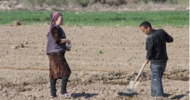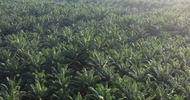The land of a traditional kingdom within Uganda has been used as a political threat and reward for over a century. It grows grain, it may have oil and gas, and it is home to the quickly expanding capital
- Le Monde Diplomatique
-
29 August 2011
The Ethiopian Minister of Agriculture and Rural Development recently released the Land Rent Contractual Agreements for land leases between the Federal Democratic Republic of Ethiopia (FDRE) and twenty-four companies or individuals.
Trying to compensate for the absence of legitimacy of these massive land deals by getting investors to adhere to a few principles is deceitful.
- farmlandgrab.org
-
17 April 2011
Corporations and bankers do not believe in farming as a way of life; they believe in farming as a very profitable business that they control. Their goal is not to improve family farming in Africa, but to eradicate it.
World food security fears may be driving the foreign rush to buy Australian farmland and agribusinesses, says Nationals' leader, Warren Truss.
The Republic of Congo has handed over 80,000 ha of arable land to a company owned and operated by 14 South African farmers.
These ‘food pirates’ come with bags full of foreign direct investment and are moving swiftly where land is available, investing in crops that can be shipped back home.
- Governance Now
-
02 Mar 2011
Modern machineries of all sorts, owned and run by agri-companies, are turning the soils inside out, destroying forests and beginning to pollute the environment to get more production.
It is clear that land-grabbing is an inherent part of the agribusiness model promoted by institutions such as the World Bank, the IMF, IFAD, the FAO or the EU.
- Via Campesina
-
13 October 2010
The people of Ethiopia have a question for you and the government of Ethiopia you represent, “Why are you giving away our land to foreigners?”
- Anyuak Media
-
30 September 2010
GRAIN says the World Bank's much anticipated report on the global farmland grab is both a disappointment and a failure.
States and mega-corporations are snapping up cheap land to produce food and making money at the expense of people in host countries.
To speak only of the ‘threats and potential opportunities’ that these investments highlight leaves underexposed the grave risks to human rights that they pose, writes Dr. Margot Salomon, from the London School of Economics
- Al Majalla
-
04 August 2010
As the world's available farming land shrinks in the face of population growth, climate change and soil degradation, Australia's vast tracts of land are going to be increasingly important for global food security. Is the sell-off in Australia's long term interests?
Another approach to achieve food security in South Sudan is to avail land to foreign nationals interested in commercial farming
- Sudan Tribune
-
21 July 2010
A new class of farmers is on the rise in Ukraine. Three articles about the situation with foreign investors taking control of the country's farmlands.
ILC is actually trying to promote some sort of dialogue between the different proposals for principles for responsible farmland investment
"People lose their access to land simply so that rich and powerful Cambodians and foreign investors can make profit from cash crops for export."
In Ethiopia, farms backed by foreign investors are growing with abundance, while native farmers subsist on food aid.
As interest in transnational land acquisition for food production grows, the importance of legal customary tenure recognition becomes more apparent.
Lawrence Asset Management's Ravi Sood suggests investing in food production in low-cost areas that are water-rich – Brazil, tropical Africa, Malaysia and Indonesia.
- Globe and Mail
-
11 January 2010
The much-discussed Congo land-lease, granting 200,000 hectares to South African farmers with a further 10 million hectares in the balance, appears to mark a departure from the usual terms underpinning foreign acquisition of fertile land by multinationals
- Pambazuka
-
07 January 2010
"Mauritius cannot depend on [Mozambique and Madagascar] for sustainable agricultural development. It’s better for us to cultivate our own land to produce more food and leave some land for future generations."
There’s a whole school of economic thought that says that Collier is wrong, that big is not necessarily better in agriculture — and that the land deals therefore might be unwise not because they’re wrong but because they’re unprofitable.
- New York Times
-
19 November 2009
The landgrab heats up, and the neocolonialists stake their claims.
- The Trumpet
-
17 November 2009
If all these land deals will be beneficial to Pakistan in the long run, why is the government refusing to divulge the details of what is the citizens’ common property?
Today's emerging new farm owners are private equity fund managers, specialised farmland fund operators, hedge funds, pension funds, big banks and the like.
Devinder Sharma talks about landgrabbing in the context of the world food crisis on "Democracy Now!"
- Democracy Now!
-
14 October 2009
It's certainly questionable whether the lease of agricultural land to foreign countries for the purposes of their own food supply is in the best interests of Pakistan, even if it brings in agricultural technology. What do the Arab farmers have that our agricultural universities don't?
- The News
-
04 September 2009
Africa’s agrarian questions are not adequately addressed by simply asking, “What is the role of African smallholders?”















